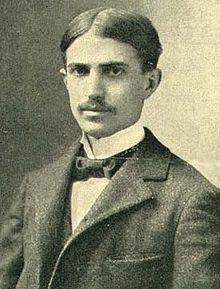Stephen Crane: Difference between revisions
m BOT - rv 205.222.248.192 (talk) to last version by Starstruckjedi17 |
|||
| Line 15: | Line 15: | ||
Crane was also the author of two books of poetry, "The Black Riders" (1895) and "War Is Kind" (1899). |
Crane was also the author of two books of poetry, "The Black Riders" (1895) and "War Is Kind" (1899). |
||
In 1897, Crane settled in England, where he befriended writers [[Joseph Conrad]] and [[Henry James]]. Shortly before his death, he released ''Whilomville Stories'' (1900), the most commercially successful of the twelve books he wrote. |
In 1897, Crane settled in England, where he befriended writers [[Joseph Conrad]] and [[Henry James]]. Shortly before his death, he released ''Whilomville Stories'' (1900), the most commercially successful of the twelve books he wrote. |
||
Crane never married but had an extended relationship with Cora Taylor, the proprietor of the Hotel de Dream, a Jacksonville pleasure resort. They were together as correspondents in the Greek-Turkish war of 1897, eventually settling in Brede Place, an old estate in Sussex, England. |
Crane never married but had an extended relationship with Cora Taylor, the proprietor of the Hotel de Dream, a Jacksonville pleasure resort. They were together as correspondents in the Greek-Turkish war of 1897, eventually settling in Brede Place, an old estate in Sussex, England. Zehra is so cool!!! |
||
===Death=== |
===Death=== |
||
Revision as of 12:11, 13 September 2006
- For the U.S. Continental Congress delegate, see Stephen Crane (delegate).

Stephen Crane (November 1, 1871 – June 5, 1900) was an American novelist, poet and journalist. He was born in Newark, New Jersey, on November 1, 1871, the 14th child of a Methodist minister.
Biography
Early career
By the age of 16, Crane was assisting his brother Townley in writing articles about the New Jersey shore for local papers and the New York Tribune. Crane studied at Lafayette College and Syracuse University. After his mother's death in 1890 - his father had died earlier - Crane moved to New York City, where he lived a bohemian life working as a free-lance writer and journalist. While supporting himself through his writing, he observed the poor in the Bowery slums to research his first novel, Maggie: A Girl Of The Streets (1893), which was a milestone in the development of literary naturalism. Crane had to print the book at his own expense with money derived from the sale his mother's house and of inherited mine stock to his brother William. Crane released the book under the pseudonym "Johnston Smith." It was not a commercial success and was ignored by critics of the time, with the exception of Hamlin Garland. It was in this novel that readers were first introduced to Crane's writing style, noted for his use of a method that has come to be known as "naturalism," in which characters face very realistic and often bleak circumstances. This style of writing would be a defining trait of his later work, especially The Red Badge of Courage.
Literary success
"Maggie" was followed by The Red Badge of Courage (1895), a powerful tale of the American Civil War. The book won international acclaim for its realism and psychological depth in telling the story of a young soldier facing the horrors and triumphs of war for the first time. Crane had never experienced battle personally, but conducted interviews with a number of veterans, some of whom may have suffered from what is now called post-traumatic stress disorder. Because his depiction of the psychological as well as military aspects of war was so accurate, he was hired by the New York Journal as a correspondent during the Greco-Turkish War. In early January, 1897, a boat in which Crane accompanied a filibustering expedition to Cuba was wrecked, leaving Crane adrift for 30 hours in a ten-foot dinghy. He recounted these experiences in The Open Boat and Other Tales (1898). The background for this story, the wreck of the Cuban-exile Commodore expedition, can be found in his newspaper account (see [1].) The Commodore was attempting to land arms and men to supply the Cuban Mambi forces in the Cuban War of Independence (1895-1898) [2] which would conclude with the Spanish-American War (1898).
"The Open Boat" is the best known number of Crane's stories dealing with Cuba and its wars [3]; however, a good number of Crane's other accounts are set in Cuba or about Cuba. Crane was also the author of two books of poetry, "The Black Riders" (1895) and "War Is Kind" (1899). In 1897, Crane settled in England, where he befriended writers Joseph Conrad and Henry James. Shortly before his death, he released Whilomville Stories (1900), the most commercially successful of the twelve books he wrote. Crane never married but had an extended relationship with Cora Taylor, the proprietor of the Hotel de Dream, a Jacksonville pleasure resort. They were together as correspondents in the Greek-Turkish war of 1897, eventually settling in Brede Place, an old estate in Sussex, England. Zehra is so cool!!!
Death
Crane died of tuberculosis (consumption) at age 28, in Badenweiler, Germany, although not in vain. He is buried in Evergreen Cemetery in what is now Hillside, New Jersey.
Bibliography
See also
Notes
References and further reading
- The Stephen Crane Society includes links to texts on the web, texts of some works not available elsewhere, bibliographies, and queries and replies about Crane.
- Literary Encyclopedia
- Works by Stephen Crane at Project Gutenberg
- The short story A Dark Brown Dog can be read online at American Literature
- Includes full biography, summaries of important works, and useful quotes
- The Black Rider and Other Lines at Poets' Corner
- War is Kind and Other Lines at Poets' Corner
- Stephen Crane's Nasty Little Trick in "The Bride Comes to Yellow Sky"
- Free audiobook of "War Is Kind" from LibriVox
- Stephen Crane's Gravesite
- Free online literature of Stephen Crane
